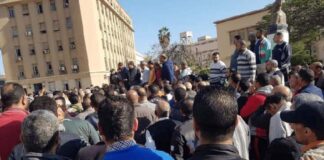Sara Poya was in Egypt in late January, at the end of the latest Israeli attacks on Gaza. She spoke with Solidarity.
Why was the Gaza war so significant in Egypt?
Egypt has strong historical links with Palestine and is the only country to share a border with Gaza so Israel’s war was an important event.
The general opinion in Egypt about [President Hosni] Mukarak was very negative, even before the war on Gaza. Mubarak’s state is a major ally of the US.
It receives the largest amount of aid after Israel and is one of the world’s largest importers of military equipment from the United States. Egypt was the first Arab state to recognise Israel following the Camp David agreement in 1978.
From 1991 Structural Adjustment Programs have slashed welfare, removed subsidies on essentials like bread and multinational corporations have benefited from the removal of protections from Egyptian workers.
In the words of one labour activist I spoke to, this has had the effect of turning Egypt into a slave plantation for the international market in which workers have no rights.
Today 60 per cent of Egyptians live on less than $2 a day and over 30 per cent of the population is illiterate.
This is a very low level of development compared to other countries in the region.
Mubarak’s state is a military dictatorship which relies for its survival on US made weapons and funding, as well as draconian state of emergency laws which have been in existence since he came to power over 25 years ago.
Demonstrations are banned, people are detained indefinitely without trial, and torture, rape and killing are everyday tools of the regime.
The support of brutal military dictatorships such as Mubarak’s is the reality of imperialism and US foreign policy in the Middle East, which lies behind all their talk of bringing democracy to the region.
What sort of solidarity movement with the Palestinians was there in Egypt during the war?
During this last war on Gaza, there were mass demonstrations of hundreds of thousands of people, the biggest organised by the Muslim Brotherhood, the largest opposition group in Egypt.
As security forces routinely attack demonstrations and arrest hundreds of their activists, the Brotherhood developed a strategy of organising snap demonstrations where 4000 or 5000 people would form a demonstration and by the time the security forces had heard about it everyone would disperse. This shows the enormous potential of the Brotherhood and their ability to mobilise.
The Egyptian movement has always been closely connected to the Palestinian struggle for national liberation. In 2000 the outbreak of the second Intifada in Palestine led to an explosion of demonstrations and mass movements in Cairo and Alexandria organised initially by university and high school students.
This led to the first public demonstration in 2001 flouting the state emergency laws where more than 1000 people gathered under a siege of thousands of policemen. Following the Israeli attack on the Jenin refugee camp in 2002, students turned Cairo University into a battleground fighting running battles with the police.
In 2008 there were hundreds of mass demonstrations, sit ins and strikes around the country demanding that the Egyptian state stop colluding with Israel by closing its borders and effectively turning Gaza into the world’s largest prison.
There is a huge feeling of anger among ordinary people against their governments and against all the Arab regimes which have failed to defend Palestine against Israeli attacks.
It was very interesting to me that at the Gaza crisis conference that was held in Qatar, which Egypt did not attend, the Hamas representative was the only Arab leader in attendance who was democratically elected.
So the effect of this is to further de-legitimise the Mubarak regime and all the Arab regimes who are puppets of the US and to highlight the undemocratic nature of these governments.
What do you think the future holds for Mubarak?
Since 2000 we have seen an upsurge in mass movements in Egypt, the movement in solidarity with the Palestinian Intifada was followed in 2004 by the Kifaya movement. Kifaya (which means ‘enough’ in Arabic) was formed to demand an end to the presidency of Hosni Mubarak.
In the last two years we have seen the outbreak of a labour movement which has involved strike action on a scale not seen since the 1940s.
On December 7, 2006 3000 female garment workers went on strike in the town of Mahalla which is home to 27,000 textile workers.
This was the beginning of a major upturn in struggle which has involved train workers, cement workers, civil servants and university students and staff.
Even Mubarak’s tax collectors went on strike for the first time since 1919 and refused to collect any taxes.
What effect would it have on the rest of the Arab world if the Mubarak dictatorship was toppled?
When I was in Cairo I saw meetings of people returning from Gaza, they described that the cities in Gaza were full of flags—every window, every shop front, people everywhere, old people, school children, everyone carrying Palestinian flags and Hamas flags.
The group reported that despite the atrocities committed by the Israelis, the Palestinians living in Gaza have not given up. From January 22 people were in the streets celebrating the defeat of the Israeli army, cheering and carrying Palestinian flags.
There is a popular slogan that students chant on demonstrations in Egypt: “the way to a free Palestine is through a free Cairo.”
This encapsulates the idea that the struggle of ordinary people against Zionism and imperialism in the region is one struggle. The toppling of the Mubarak dictatorship would be a major victory in this struggle.





